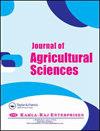Improving Efficiency and TFP of Lowland Paddy Rice Farmers in Kwara State of Nigeria
IF 0.7
Q3 AGRICULTURE, MULTIDISCIPLINARY
引用次数: 3
Abstract
Purpose: The pressure on land for agricultural purposes is on the rise and sustainable agriculture remains the panacea for herdsmen attack on arable crop farmers in the study area. The present research empirically measured and identified the factors that influenced efficiency and Total Factor Productivity (TFP) of lowland paddy rice farmers in Kwara State of Nigeria. Research Methodology: The study made use of cross-sectional data collected from 200 active farmers during the 2016 cropping season via Multi-stage sampling technique. Instrument used to elicit information from the active farmers was structured questionnaire complemented with interview schedule and the collected data were analyzed using descriptive and inferential statistics. Findings: The results proved that majority of the farmers were not smart farmers which is responsible for negative TFP in most of the Decision making units (DMUs) as evident from poor robust increase in output index. However, the study inferred that there remained more untapped potentials in paddy rice production in the studied area. Limitations: The scope of the research is limited to lowland rice farmers in Kwara State of Nigeria. Originality/Value: Therefore, it was recommended that Government and non-governmental organisations should formulate supportive policies targeting sustainability of rice production viz. proper allocation of farm resources and also welfare improvement of the resource poor farmers for cultivating rice crops in the studied area.提高尼日利亚夸拉州低地水稻农民的效率和全要素生产率
目的:研究区农业用地压力日益增大,可持续农业仍是解决牧民袭击耕地农民问题的灵丹妙药。本研究对尼日利亚Kwara州低地水稻农民的效率和全要素生产率(TFP)的影响因素进行了实证测量和识别。研究方法:本研究采用多阶段抽样技术从2016年种植季的200名活跃农民中收集的横断面数据。采用结构化问卷与访谈计划相结合的方法,对收集到的数据进行描述性统计和推断性统计分析。研究发现:结果证明,大多数农民不是聪明的农民,这是大多数决策单位(dmu)负TFP的原因,从产出指数的疲弱强劲增长中可以看出。然而,研究推断,研究区水稻生产仍有更多未开发的潜力。局限性:这项研究的范围仅限于尼日利亚Kwara州的低地稻农。原创性/价值:因此,建议政府和非政府机构制定扶持政策,以水稻生产的可持续性为目标,即适当分配农场资源,并改善资源贫乏的农民在研究地区种植水稻作物的福利。
本文章由计算机程序翻译,如有差异,请以英文原文为准。
求助全文
约1分钟内获得全文
求助全文
来源期刊

Journal of Agricultural Sciences
AGRICULTURE, MULTIDISCIPLINARY-
CiteScore
1.80
自引率
0.00%
发文量
0
 求助内容:
求助内容: 应助结果提醒方式:
应助结果提醒方式:


